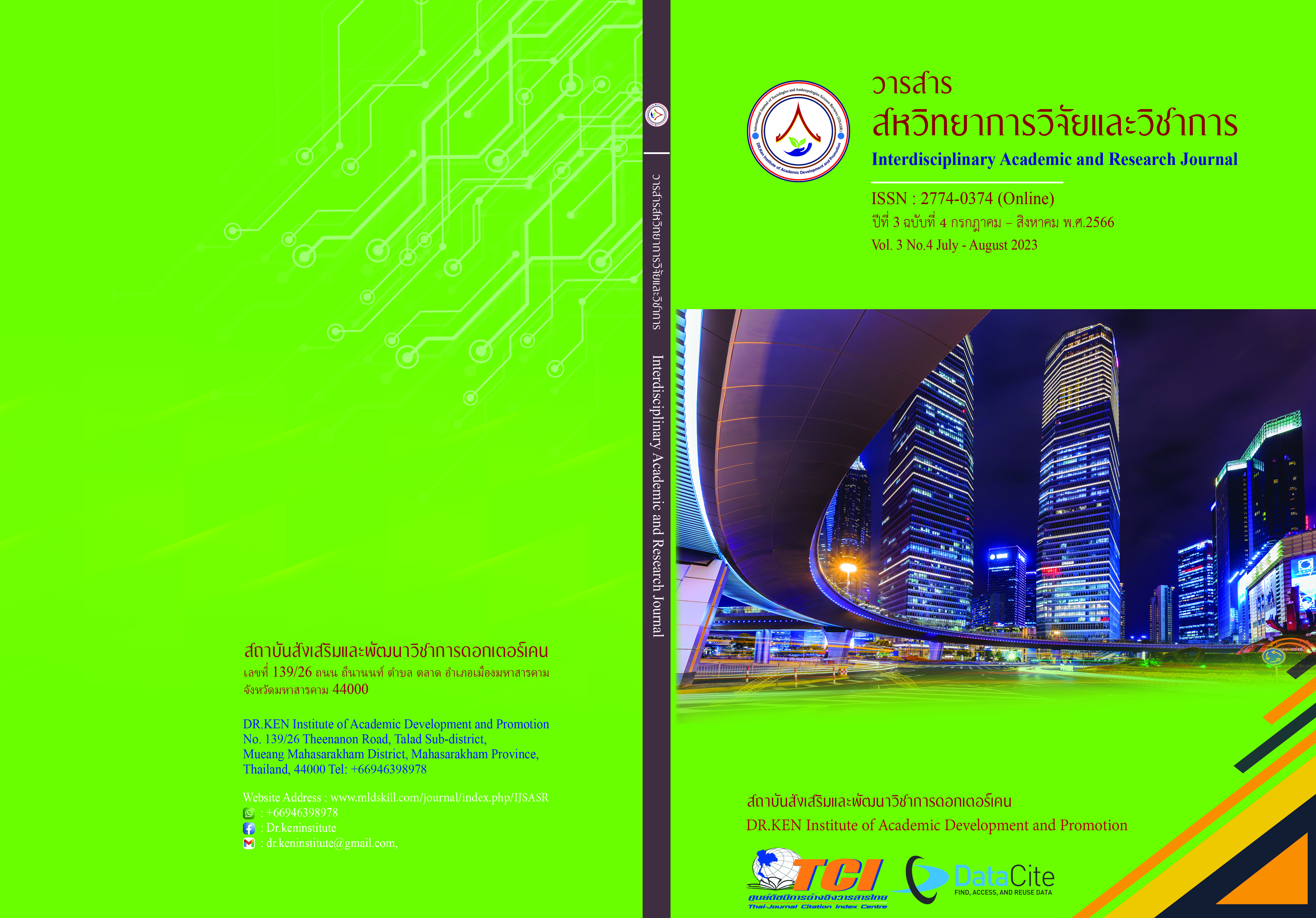The Elderly Promote and Potential Development in Chiangrai Province
DOI:
https://doi.org/10.14456/iarj.2023.189Keywords:
Promotion; , Development;, Potential; , ElderlyAbstract
The elderly population is regarded as a person with potential, knowledge, ability, and life experience. Therefore, they should be encouraged and developed their potential to bring out the existing potential to help their communities and society development in addition, Thai society has become a fully aging society and then came to this research article. This research article aimed to promote potential development in Chiangrai elderly. The research area focused on Chiangrai Province, collecting data through in-depth interviews with 6 provincial elderly leaders, group interview 1 group (8 persons) of provincial elderly leaders, and a workshop with 80 district elderly leaders from 18 districts in Chiangrai Province and lead to the grouping promoted and potential development in elderly for community development activities. The research found 1)Chiangrai elderly had participatory potential in community development, participatory occupation, wisdom part had a strong elderly working network and work continually by working integrated with other elderly issues.2)This project developed elderly potential in Chiangrai province by participatory community development 20 elders and developed network district elderly leader in 19 districts (190 persons) lead to working mechanism in committee pattern for coordinate mechanism between district and provincial level, elderly data sharing in needs and situation once per month.
References
กรมกิจการผู้สูงอายุ. (2566). สถิติผู้สูงอายุ. Retrieved May 1, 2023 from: https://www.dop.go.th/th/know/side/1/1/1962
กรมกิจการผู้สูงอายุ. (2566). สังคมผู้สูงอายุในปัจจุบันและเศรษฐกิจในประเทศไทย. Retrieved May 1, 2023 from: https://www.dop.go.th/th/know/15/926
จิราพร ไชยเชนทร์. (2564). การพัฒนาคุณภาพชีวิตผู้สูงอายุในตำบลท่าทองใหม่ อำเภอกาญจนดิษฐ์ จังหวัดสุราษฎร์ธานี. วารสารนาคบุตรปริทรรศน์ มหาวิทยาลัยนครศรีธรรมราช, 13(1), 204-215.
เจียรนัย ทรงชัยกุล. (2560). การครองตนในครอบครัวอย่างมีความสุขของผู้สูงอายุ. Retrieved May 11, 2017 from: https://www.stou.ac.th/stoukc/elder/main1_3.html
เฉลิมศรี เหล่าสุนทร และคณะ. (2562). กลยุทธ์การใช้ศักยภาพของผู้สูงอายุเพื่อพัฒนาชุมชนท้องถิ่นในจังหวัดเชียงราย. วารสารมหาจุฬาวิชาการ, 6(ฉบับพิเศษ), 125-139.
ชัยวัฒน์ โยธี. (2563). การมีส่วนร่วมในการพัฒนาชุมชน – ท้องถิ่นในด้านประชาสังคมผู้สูงอายุชุมชนสามัคคีจังหวัดยะลา. วารสารนานาชาติ มหาวิทยาลัยขอนแก่น สาขามนุษยศาสตร์และสังคมศาสตร์, 10(3), 137-154.
ชาญชัย ชัยรุ่งเรื่อง. (2558.). การพัฒนาคุณภาพชีวิตผู้สูงอายุ. วารสารวิชาการ มหาวิทยาลัยกรุงเทพธนบุรี, 4(2), 14-28.
ณัฎฐ์ฐิตตา เทวาเลิศสกุล และคณะ. (2559). แนวทางการพัฒนาผู้สูงอายุจากภาระให้เป็นพลัง กรณีศึกษาเทศนครรังสิต. Veridian E-Journal, Silpakorn University ฉบับภาษาไทย สาขามนุษย์ศาสตร์ สังคมศาสตร์และศิลปะ, 9(1), 529-545.
นพพร ระรินทร์. (2564). การมีส่วนร่วมของผู้สูงอายุในการพัฒนาชุมชน. วารสารวิชาการมนุษยศาสตร์และสังคมศาสตร์ มหาวิทยาลัยราภัฏธนบุรี, 4(2), 111-125.
ประยูร อิมิวัฒร์,นำขวัญ วงศ์ประทุม,กฤษณะ สมควร และ สมเกียรติ ตุ่นแก้ว. (2562.).แนวทางการพัฒนาคุณภาพชีวิตผู้สูงอายุโดยใช้ศูนย์การเรียนรู้ชุมชนเป็นฐาน.วารสารสันติศึกษาปริทรรศน์ มหาวิทยาลัยจุฬาลงกรณ์ราชวิทยาลัย, 7(2), 364 – 378.
สมชาย ชัยจันทร์. (2565). ชุมชนท้องถิ่นกับการพัฒนาศักยภาพของผู้สูงอายุในชุมชน. วารสารวิจัยและพัฒนาด้านสุขภาพ สำนักงานสาธารณสุขจังหวัดนครราชสีมา, 8(1), 14-15.
อรนิษฐ์ แสงทองสุข. (2563). การศึกษาคุณภาพชีวิตของผู้สูงอายุในประเทศไทย กรณีศึกษาเขตกรุงเทพมหานคร ปทุมธานี และนนทบุรี. ใน ประชุมวิชาการระดับชาติและนานาชาติมหาวิทยาลัยศรีปทุม ครั้งที่ 4 ประจำปี 2562 วันเสาร์ที่ 30 กันยายน พ.ศ.2563. มหาวิทยาลัยศรีปทุม.
อรสา ธาตวากร. (2563). การพัฒนาศักยภาพผู้สูงอายุในภาวะพฤฒพลังให้เกิดการยังประโยชน์ด้านสังคม. วารสารสังคมภิวัฒน์, 10(3), 39-63.
อัจฉราภรณ์ สนามพล และคณะ. (2565). การพัฒนาศักยภาพด้านอาชีพจากผลิตภัณฑ์สมุนไพรภูมิปัญญาล้านนาของผู้สูงอายุในชมรมสมุนไพรจาวยอง วัดป่าตาล ตำบลบวกค้าง อำเภอสันกำแพง จังหวัดเชียงใหม่. วารสารสังคมศาสตร์และมานุษยวิทยาเชิงพุทธ, 7(9), 360-372
Downloads
Published
How to Cite
Issue
Section
License
Copyright (c) 2023 Wichulada Matanboon, Bundit Deemoh, Banjit Sairorkham

This work is licensed under a Creative Commons Attribution-NonCommercial-NoDerivatives 4.0 International License.
Copyright on any article in the Interdisciplinary Academic and Research Journal is retained by the author(s) under the under the Creative Commons Attribution-NonCommercial-NoDerivatives 4.0 International License. Permission to use text, content, images, etc. of publication. Any user to read, download, copy, distribute, print, search, or link to the full texts of articles, crawl them for indexing, pass them as data to software, or use them for any other lawful purpose. But do not use it for commercial use or with the intent to benefit any business.
















.png)


